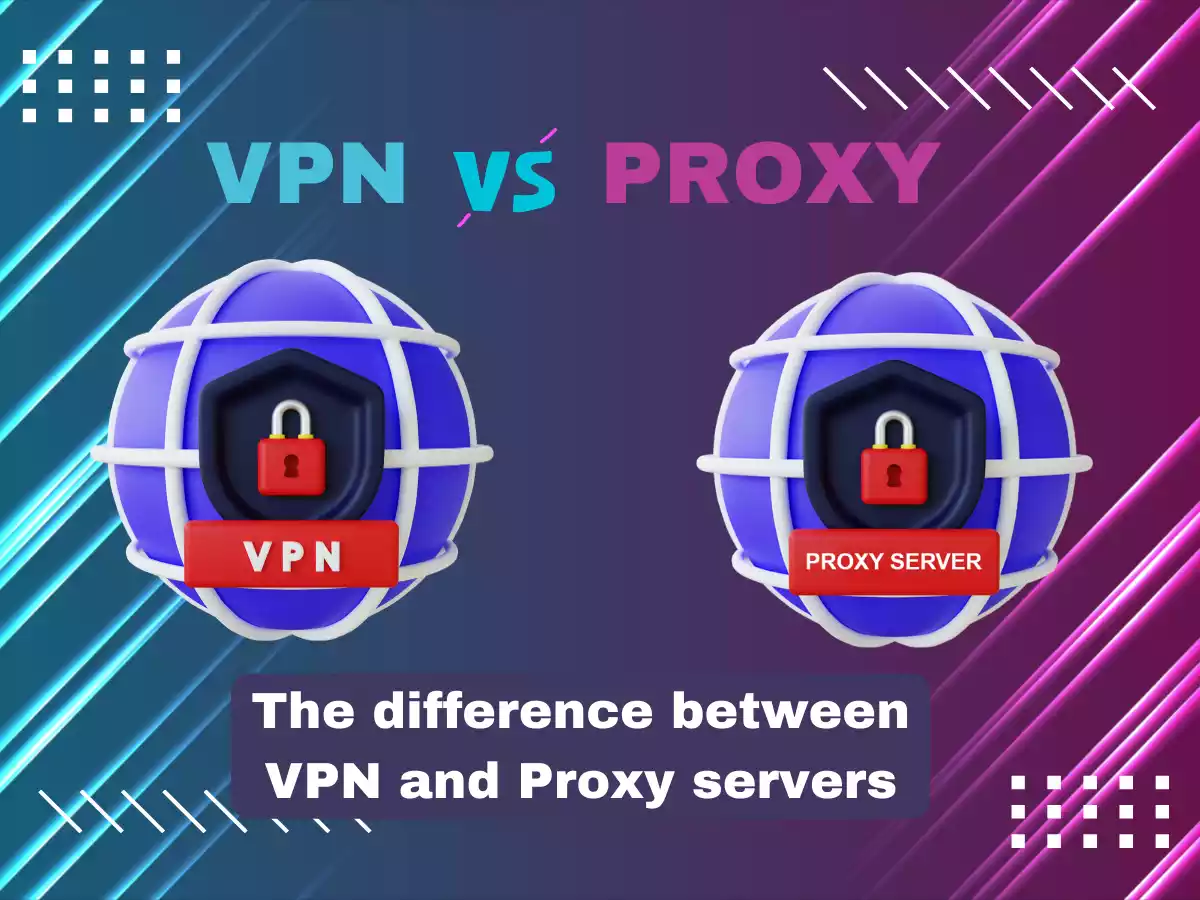In today’s interconnected world, privacy and security have become paramount concerns for internet users. To address these concerns, individuals often turn to tools like VPNs (Virtual Private Networks) and proxy servers. Both VPNs and proxy servers offer a means to protect one’s online identity and data, but they are not interchangeable. Understanding the differences between VPNs and proxy servers is crucial in determining which solution is best suited to meet specific needs. This blog post explores the disparities between VPNs and proxy servers, shedding light on their functionalities, features, and applications. By the end, you will gain a clear understanding of these technologies and be able to make an informed decision on which option is most appropriate for their online protection.
Table of Contents
ToggleDefinition and function of VPNs
VPNs, or Virtual Private Networks, are tools designed to create a secure and private connection over a public network, such as the internet. They establish a virtual tunnel between the user’s device and a remote server operated by the VPN service provider. This tunnel encrypts all data transmitted between the user’s device and the server, ensuring that it remains secure from prying eyes.
The primary function of a VPN is to enhance privacy and security while browsing the internet. By encrypting data, VPNs protect sensitive information, such as passwords, financial transactions, and personal data, from potential hackers or eavesdroppers. Additionally, VPNs can mask the user’s IP address by routing internet traffic through the VPN server, making it appear as if the user is accessing the internet from a different location.
VPNs offer several benefits
Enhanced Security: The encryption provided by VPNs ensures that sensitive information remains protected, even on public Wi-Fi networks or in countries with restrictive internet policies.
Anonymity and Privacy: By hiding the user’s IP address and encrypting internet traffic, VPNs provide a level of anonymity and privacy, preventing websites and online services from tracking their online activities.
Access to Geo-Restricted Content: VPNs allow users to bypass geographical restrictions by connecting to servers in different countries, granting access to region-restricted content or services.
Remote Access: VPNs enable secure remote access to private networks, making them valuable for businesses and individuals who need to access files or resources remotely.
Popular VPN services include ExpressVPN, NordVPN, and CyberGhost. These services typically offer user-friendly applications for various devices and operating systems, making it easy to set up and use a VPN for both novice and experienced users.
Definition and function of proxy servers
Proxy servers act as intermediaries between the user’s device and the internet. When a user requests a web page or any online content, the request first goes to the proxy server, which then forwards the request to the target website or server on behalf of the user. The response from the website is then relayed back to the user through the proxy server. In this way, the proxy server acts as a middleman, handling all communication between the user and the internet.
The primary function of a proxy server is to provide various benefits such as improved performance, caching, and access control. Here’s a closer look at its functions:
Improved Performance
Proxy servers can cache frequently accessed web pages and content. When subsequent requests are made for the same content, the proxy server can deliver it directly without having to retrieve it from the internet. This caching mechanism helps reduce bandwidth usage, speeds up content delivery, and improves overall browsing performance.
Anonymity and Privacy
Similar to VPNs, proxy servers can hide the user’s IP address by acting as an intermediary. Websites and online services only see the IP address of the proxy server, keeping the user’s real IP address hidden. However, it’s important to note that not all proxy servers provide encryption, so data transmitted through a proxy may not be as secure as with a VPN.
Access Control and Filtering
Proxy servers can be configured to restrict access to specific websites or types of content. This feature is often employed in organizations and educational institutions to enforce internet usage policies, block certain websites, or filter content based on categories or keywords.
Bypassing Geo-Restrictions
Similar to VPNs, some proxy servers can be used to access geo-restricted content by routing traffic through servers located in different countries. This allows users to bypass regional restrictions and access content that may otherwise be unavailable in their location.
Notable proxy server solutions include Squid, Nginx, and Apache HTTP Server, which can be set up on local networks or used as cloud-based services.
While proxy servers offer some level of anonymity and access control, it’s important to remember that they typically lack the robust encryption and comprehensive security features provided by VPNs.
Differences between VPNs and proxy servers
Although VPNs and proxy servers serve similar purposes of enhancing privacy and security, they differ in several key aspects. Here are the primary differences between VPNs and proxy servers:
Encryption and Security
VPNs: VPNs encrypt all internet traffic between the user’s device and the VPN server, ensuring that data is secure and protected from potential eavesdropping or hacking attempts. This encryption extends to all applications and services running on the device, providing comprehensive security.
Proxy Servers: Proxy servers may not always provide encryption. While they can hide the user’s IP address, the data transmitted between the user’s device and the target website is not necessarily encrypted. This means that sensitive information, such as passwords or credit card details, could be vulnerable to interception.
IP Address Hiding
VPNs: VPNs route all internet traffic through their servers, effectively masking the user’s IP address. Websites and online services only see the IP address of the VPN server, making it difficult to trace the user’s actual location or identity.
Proxy Servers: Proxy servers also hide the user’s IP address by acting as an intermediary, but the target website can still see the IP address of the proxy server. While this provides a level of anonymity, it may not offer the same level of privacy as a VPN.
Compatibility with Applications and Devices
VPNs: VPNs typically work at the system level, meaning they encrypt and route all internet traffic from the device. This ensures that all applications, including web browsers, email clients, and other online services, benefit from the VPN’s protection.
Proxy Servers: Proxy servers usually work at the application level, requiring manual configuration within each application to utilize the proxy server. This means that not all applications or services running on the device may be routed through the proxy, potentially leaving certain data exposed.
Speed and Performance
VPNs: While VPNs provide encryption and security, they may introduce some overhead due to the encryption process. This overhead can result in a slight reduction in internet speed and performance compared to using a direct connection.
Proxy Servers: Proxy servers, especially caching proxies, can enhance performance by delivering cached content directly to the user. This caching mechanism reduces bandwidth usage and speeds up content delivery, resulting in potentially faster browsing speeds.
Legal and Ethical Concerns
VPNs: VPNs are generally considered legal and widely used for various purposes, including privacy protection, accessing geo-restricted content, and secure remote access. However, some countries may have restrictions or regulations regarding VPN usage.
Proxy Servers: Proxy servers are commonly used for legitimate purposes, such as improving performance or enforcing internet usage policies in organizations. However, they can also be used for malicious activities, such as bypassing restrictions to engage in illegal actions. Consequently, certain proxy server usage may be restricted or monitored in certain jurisdictions.
It’s important to evaluate these differences when deciding between a VPN and a proxy server, as they have distinct implications for privacy, security, compatibility, and overall internet experience.
Which one should you choose?
The choice between a VPN and a proxy server depends on your specific needs and priorities. Here are some factors to consider when deciding which option is more suitable for you:
Security and Privacy
If your primary concern is robust security and privacy, a VPN is the better choice. VPNs provide end-to-end encryption, ensuring that all data transmitted between your device and the VPN server remains secure. This encryption is particularly important when using public Wi-Fi networks or accessing sensitive information. VPNs also hide your IP address, providing a higher level of anonymity.
Access to Geo-Restricted Content
If your main goal is to access region-restricted content or bypass censorship, both VPNs and proxy servers can help. However, VPNs are generally more reliable in bypassing geo-restrictions since they route all your internet traffic through servers located in different countries. Proxy servers may encounter limitations in accessing certain content or services that actively block proxy traffic.
Compatibility and Ease of Use
VPNs are designed to work at the system level, making them compatible with all applications and devices running on your device. Once set up, VPNs typically work automatically in the background. Proxy servers, on the other hand, often require manual configuration within each application that you want to use with the proxy. If you need a solution that works seamlessly across all applications, a VPN is a more convenient choice.
Performance
VPNs may introduce some overhead due to the encryption process, which can slightly impact internet speed and performance. Proxy servers, especially caching proxies, can enhance performance by delivering cached content directly to you. If performance is a critical factor and you prioritize speed, a proxy server might be a better option.
Legal Considerations
Ensure that you understand the legal implications and regulations regarding VPNs and proxy servers in your country. While VPNs are generally legal, some countries have restrictions on VPN usage. Proxy servers, while widely used, may have limitations depending on local regulations and policies.
Ultimately, the decision boils down to your specific needs. If you prioritize strong security, privacy, and compatibility across all applications, a VPN is likely the better choice. However, if you mainly require access to region-restricted content or improved performance, a proxy server may suffice. Consider your priorities and evaluate the features of each option to make an informed decision that aligns with your requirements.
Conclusion
In the digital age, where privacy and security are paramount, understanding the differences between VPNs and proxy servers is essential. While both options offer ways to protect your online identity and data, they have distinct characteristics that make them suitable for different purposes.
VPNs excel in providing comprehensive security through encryption, ensuring that all your internet traffic is protected from potential threats. They also offer anonymity by hiding your IP address and are compatible with all applications and devices, making them a convenient choice for overall privacy and accessibility.
On the other hand, proxy servers offer benefits such as improved performance through caching and can help bypass geo-restrictions. They act as intermediaries between your device and the internet, hiding your IP address and providing some level of anonymity. However, they may lack the same level of encryption and system-wide compatibility as VPNs.
When making a decision, consider your specific needs and priorities. If you prioritize strong security, privacy, and compatibility across all applications, a VPN is the recommended choice. If your primary goal is accessing geo-restricted content or improving performance, a proxy server may suffice.
Ultimately, both VPNs and proxy servers have their merits and limitations. By understanding their differences and evaluating your requirements, you can make an informed decision to safeguard your online presence and enhance your internet experience. Remember, your choice should align with your desired level of security, privacy, and accessibility in the online realm.




